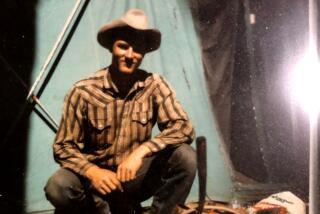Ranger Reminisces After a Lifetime in the Mountains
- Share via
CHOTEAU, Mont. — Two years ago when the Forest Service ordered an inventory of its trails--count every switchback, water bar and blaze--Ray Mills sat down at his desk, closed his eyes and visualized.
Mills remembered the 33 switchbacks on the east side of Headquarters Pass and the six on the west side.
On and on, until he accounted for 1,028 miles of trails on the Lewis and Clark National Forest west of Choteau.
“Like a computer,” says District Ranger Mike Munoz. “He spit it right out, without a doubt.”
Earlier this month, Mills retired after 45 years with the Lewis and Clark forest west of Choteau. Over those 4 1/2 decades he has ridden the Rocky Mountain Front, supervised trail crews and wrangled horses and mules.
He managed the Forest Service’s 55 head of horses and mules. Three times each winter, Mills would snowshoe an 80-mile back-country loop to survey snow depths.
“I’ve been blessed with two things,” Mills said during a rare session at his desk. “I have worked with great people, and I have done what I wanted to do all my life. Not too many people can say they have spent a lifetime doing what they wanted.”
Mills, who grew up in Augusta, signed on with the Forest Service as a trail maintenance worker in June 1955. He pestered the ranger who eventually hired him.
“Finally he said, ‘I’ll hire you to get you to quit bugging me,’ ” Mills recalled.
Mills had just turned 18.
“We had three head of mules and two horses and a crosscut saw, and away we went,” he said. “We had a chain saw, but it never ran.
“I have spent the biggest share of the time out there, and a good share of that time, we spent back in the Bob Marshall.”
Except for three summers as a dispatcher, Mills remembers “darned little” time indoors. That one spell was his wife Irene’s idea, and she changed her mind in a while.
“My wife convinced me I should be closer to home,” Mills said, “but after a couple of summers, she decided I should be off in the field.
“But I am blessed with a wonderful wife. She raised the kids and took care of the stock, and she sent me off with a hot meal every morning I was home.
“She realized she needed to share me with the mountains,” Mills said. “We’ve been married 42 years, so we did something right.”
In all those years riding the back country, Mills has seen plenty of bears--he’s seen three grizzlies already this spring, which is unusual. Mostly, the big bears are out on the plains and river bottoms right now.
“A sow and cubs came charging down a trail once,” Mills says. “She charged us and then ran. But it made the hair stand up on the back of my neck.”
And he has seen more wolverines than Disney.
“Once, a porcupine came scooting down the trail about as fast as a porcupine can scoot,” he said, “and a couple of minutes later, here came a wolverine after it.
“Another time, in the fog on Headquarters Pass, I saw one messing around with a herd of goats.”
But it was a black bear that gave Mills a real scare. He and a co-worker bumped into the bear on the back side of Elk Hill.
“The bear jumped out from behind a log. He ran off and then turned around and came back. He meant business, and he came right after us.
“We separated because we didn’t want both of us to get hurt. He came within 20 feet of us before he backed off.”
Mills doesn’t carry pepper spray and seldom packs a firearm.
“I don’t bother the bears and they don’t bother me. We have coexisted for years and I have no desire to kill one,” Mills said.
Mills attended college, but it didn’t take.
“I got down there and those rooms got smaller and smaller. I decided I would rather go back to the hills, and I did. I was just married, but we decided to do it. I’ve never regretted it. I spent a lifetime doing what I wanted. You can’t have any regrets that way.”
He says the number of people using the forest has changed dramatically.
In 1957, Mills and a fellow worker encountered their first backpackers.
“We were working a trail out of Benchmark, and we ran into a family of five--a mom, a dad and three kids. The dad told us this was the only vacation they could afford. We snickered as we rode on down the trail and told ourselves that it would never catch on.
“If we’d had any foresight, we would have bought into a backpack company and been millionaires by now,” he said.
In general, Mills said, people in the back country are better prepared these days. They are better equipped and more knowledgeable. And, he says, they are much more apt to call and get information before heading into the back country, while the old hands are more apt to blunder through.
“There are way, way more people using the forest,” Mills said. “We would go 10 days without seeing anybody. You don’t do that now.”
“Without a doubt, Ray has been a tremendous asset,” said ranger Munoz. “He has the longtime, institutionalized knowledge of the Bob and the Scapegoat [wilderness areas] and the Forest Service itself.
“There are a few old-time forests, and this is one of those places, where we use pack trains and horses, and Ray is a wealth of knowledge, even about ourselves.
“I don’t know that you can replace someone who has worked 45 seasons in one place,” Munoz said.
Mills says he has a couple of fly rods that need flexing, but he will miss the Forest Service.
“Without a doubt, I’m going to miss my mules,” Mills reflected. “I’m working my third pack string. I dearly love the stock.
“I’ll miss working with the young trail crews. And I’ll miss the camaraderie. There are some very fine people working here.”
Mills won’t be missing the mountains, though. He plans to help his brothers run Mills Outfitting, which outfits in the Dearborn.
“It’s kind of like going home,” Mills said.
More to Read
Sign up for The Wild
We’ll help you find the best places to hike, bike and run, as well as the perfect silent spots for meditation and yoga.
You may occasionally receive promotional content from the Los Angeles Times.






